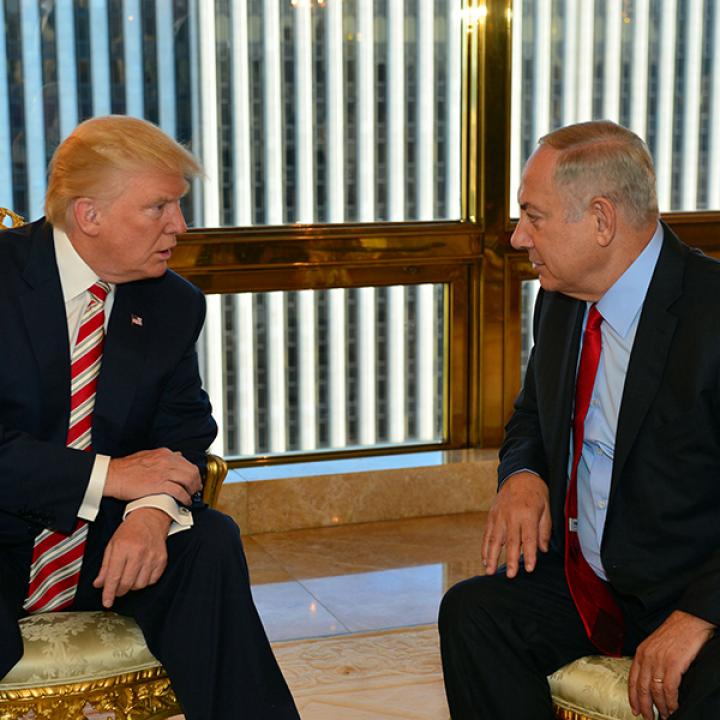
- Policy Analysis
- Articles & Op-Eds
Thank You, President Trump, for Vetoing Israeli Annexation in the West Bank
Also published in Times of Israel

Annexation would transform Israel’s legitimate military occupation of the West Bank into an illegitimate land grab, while dismantling the entire edifice of Middle East diplomacy for no discernible strategic benefit.
President Trump was right to announce that he would not allow Israel to proceed with plans for West Bank annexation. Five years ago, the last time Israelis considered annexing a piece of the West Bank, many friends of Israel warned against such a self-defeating move. I argued back then that annexation was devoid of logic, would abandon a relatively secure and surprisingly durable status quo for no compelling reason and would badly imperil both U.S. and Israeli interests. Thankfully, the United Arab Emirates offered a better alternative—full peace and normalization through what would become the Abraham Accords—and the crisis was averted.
Until President Trump’s decisive action, we were facing another annexation crisis, triggered by the performative decision of certain Western countries to recognize the State of Palestine. Such declarations will contribute nothing to end the Hamas-Israel War, secure the release of Israel’s hostages, or relieve the humanitarian disaster in Gaza, but they may temporarily ease the domestic political pressure embattled leaders face “to do something” about the Israeli-Palestinian situation. Across the political spectrum, Israelis have denounced statehood recognition as a gift to Hamas. Given that Hamas leaders have welcomed these declarations as one of the “fruits of October 7,” they have a point.
If governments recognizing Palestine had devoted one-tenth the diplomatic effort on behalf of Israel’s hostages—demanding access by the International Red Cross or conditioning recognition of Palestine on the hostages’ freedom—perhaps Israelis’ reaction would be more muted. But with Hamas only continuing to taunt with depraved images of the captives, most Israelis have nothing but contempt for the grandstanding of countries lining up to support “Palestine.”
Among powerful voices in Israel, that contempt prompted calls to retaliate by annexing part or all of the West Bank. Since 147 countries recognized Palestine before France, Britain, Australia, and Canada just did so, it is not clear how these moves change anything, but the surge to respond defiantly is picking up steam. This was a bad idea in 2020 and it is an even worse idea today.
In legal terms, unilateral annexation—often called “extending Israeli law” to the relevant territory—would transform Israel’s legitimate military occupation of the West Bank into an illegitimate land grab. For the past 58 years, Israel has enjoyed the benefits of a United Nations Security Council resolution approved after the June 1967 Six Day War that allowed it to control captured lands until the Arab parties proposed a peace that would convince Israel to withdraw to “secure and recognized” borders. Since that has not happened, Israel has had every right to maintain control of the territories ever since. While there are reasonable arguments over the legitimacy of Israeli settlement construction in the West Bank, Israel cannot determine by itself the final disposition of the territories, which would undermine the legal basis for its presence.
In a practical sense, annexation would be a diplomatic disaster for the Trump administration. Not only would it kill whatever slim chance remains to expand the Abraham Accords, the president’s signature diplomatic achievement, but the bright red warning signs from Abu Dhabi suggest annexation risks having the accords themselves unravel.
That’s not all—there is a very real possibility that Israel’s original Arab peace partners, Egypt and Jordan, would be forced by their own public opinion to take severe retaliatory measures, perhaps even to suspend their peace treaties with Israel. This would come at a painful cost, since both countries count on Israel for vital natural resources, but they may feel they have no choice but to act. And all these giant steps backwards would badly undermine the ability of the United States to stitch together the de facto Arab-Israel military coalition that so effectively countered Iran’s missile and drone barrages against the Jewish state just last year.
For some Israelis, this is a regrettable but acceptable price to pay to defend their right to self-defense in the post–October 7 era. Despite the barbarism of Hamas’s assault, they saw global sympathy quickly dissipate, with even friendly capitals calling for Israel to leave Gaza with a battered but defiant Hamas still in control. When they see these countries recognizing Palestine, they hear echoes of the late Israeli diplomat Abba Eban warning against demands to shrink Israel to what he called “Auschwitz borders.”
To annexation advocates, the Trump administration’s more sympathetic approach gives Israel an opportunity to construct its own future without fear of American meddling. Just as with the move of the U.S. embassy to Jerusalem in 2017, which I supported, they contend annexation would trigger little global reaction.
This is especially the case, many argue, if Israel only annexes a slice of the West Bank, not all of it. There are several variations of the limited annexation idea, ranging from annexing the settlement blocs that abut the pre-1967 Green Line to annexing the 30 percent of the territory originally allotted to Israel in Trump’s abortive 2020 “Deal of the Century” peace plan.
An especially popular version is to annex the Jordan Valley, the long, narrow, lightly populated strip west of the Jordan River that many security-focused Israelis consider essential for the country’s defense. Even critics of the current government advocate for the idea, though how annexation would improve on Israel’s current control of the area is unclear.
What is clear is that, in the current environment, distinctions between full and limited annexation would be totally lost on Israel’s Arab peace partners. Whatever leeway some may have given Israel on this issue before October 7, it has disappeared in the rubble of Gaza. Precisely because of the daily images of the horrific human toll of the war—for which Hamas bears overwhelming responsibility—Arab leaders once indifferent to Palestine cannot afford to be indifferent now.
The result would be that Israeli retaliation against Western states for recognizing Palestine would drive Arab governments into their own retaliatory spiral. Everyone would suffer. So, I hope President Trump clarifies that his opposition to annexation extends to all such proposals, limited or maximal.
The wisest Israeli response to the flurry of Palestinian statehood recognitions would be to ignore them, a confident, self-assured position that would likely drive the leaders of France, Britain, Australia and Canada crazy. If, for political reasons, Israel needs to respond, then taking targeted measures against the offending states—like withdrawing Israel’s ambassador from London or shutting France’s consulate in Jerusalem—are options. But to destroy the entire edifice of Middle East diplomacy out of pique, for no discernible strategic benefit, is self-defeating folly that would have negative implications for longstanding U.S. interests in the region. Kudos to President Trump for stopping this madness.
Robert Satloff is The Washington Institute’s Segal Executive Director and Howard P. Berkowitz Chair in U.S. Middle East Policy. This article was originally published on the Times of Israel website.



